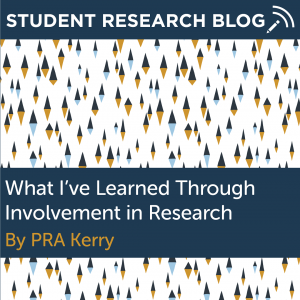By Kerry Morgan, OUR Peer Research Ambassador
In my years at UConn, I have been involved in many different types of activities. Whether it be sports, academics, volunteering, hobbies, there is certainly something for everyone at UConn. As I am beginning my senior year at UConn, I look back and reflect on the time I have had here, and most importantly the things I’ve learned and enjoyed. Now, I can say with clarity that research shaped me into the person I am today, and it has been one of my most cherished experiences from my undergraduate education.
As a Freshman at UConn, I was much like any other student: starting new. I wanted to make the most out of my four years– as many others do– but I didn’t know how to yet. I joined numerous clubs, I volunteered, but getting involved in research seemed so unattainable. I wondered how people got involved and where they worked on research. What was I interested in researching? What if I’m not good at research? Where do I even begin? All these questions held me back until I finally decided to take the first step sophomore year. Since then, I have worked in three different labs– all in completely different fields. From kinesiology and human clinical research to genetic research of cerebellar development, I saw all different aspects of research. Not every experience is the same, but once you find what you are passionate about, you never look back!
Why did I get involved in research?
This is a question with a slightly different answer for everyone, and your answer may even change over time. Personally, I got involved in research to learn. Of course we all learn in our daily classes each semester, but learning about something new and completely unfamiliar is beyond exciting. It may be something you have long thought about or something completely new to you. Either way, research has a way of opening up a whole new world of ideas, thinking, and creativity. Before getting involved in research, I never could have imagined that I would have learned so much. Not just about science, but about how to think critically. Research has taught me how to problem solve, analyze, and think creatively.
What were my research goals and interests?
When I first thought about getting involved in research, I honestly had no idea what I was interested in. I figured “genetics” and “psychology” were two areas to start with, but at this point in my academic career, anything would have been exciting to me. As I got older and read more, I became fascinated by stem cell research, specifically relating to nerves and bones. I began applying to opportunities for summer research in hopes of finding a project that would fit my specific interests. Luckily, I came across HRP (Health Research Program) and found several faculty members at UConn Health that were working on orthopedic research and neuroscience research. I applied and interviewed with a variety of PI’s, but found that what I was most interested in was not what I had initially expected. After participating in HRP at Dr. James Li’s lab, I was certain I had found what I was truly interested in. One and a half years later, and I am still working on cerebellar research, which I would consider a combination of developmental biology, genetics, and neuroscience. I learned that it is ok to try new things, and maybe you will even surprise yourself by what you end up loving. Most importantly, you aren’t expected to know exactly what you love when you haven’t seen a fraction of what’s out there yet!
What have I learned from research?
This question is not a simple one, for I feel I have learned so many indescribable things from my research experiences.
First and foremost, I have learned to be confident. The trust and responsibility that my PI gave me right at the start boosted my confidence by a ten-fold. I felt that I was treated not like a student, but rather an equal. I was given every opportunity to contribute, present, and discuss in a manner that I had never been accustomed to before this experience. In addition, I felt accomplished after learning and mastering intricate lab tasks that I could never have imagined would be within my skillset as an undergrad.
As for everything else I learned in my research experience, it would probably be easier to list what I haven’t learned. The first few weeks at my current lab were beyond overwhelming. The rate of information being taken in was at an all-time high for me, and I felt I would never fully learn everything. But, slowly and surely, everything does come with ease. Repetition is the key to any success, and somehow I became familiar with concepts far beyond my years.
Every day in a lab is an opportunity to learn something. Whether it be procedural or conceptual, the potential is limitless. When I think back on my experience in research, it makes me quite proud thinking of where I started to what I have accomplished. It took a lot of hard work to get here, but it has been the most rewarding experience imaginable.
Kerry is a senior majoring in Molecular & Cell Biology and Allied Health Sciences. Click here to learn more about Kerry.